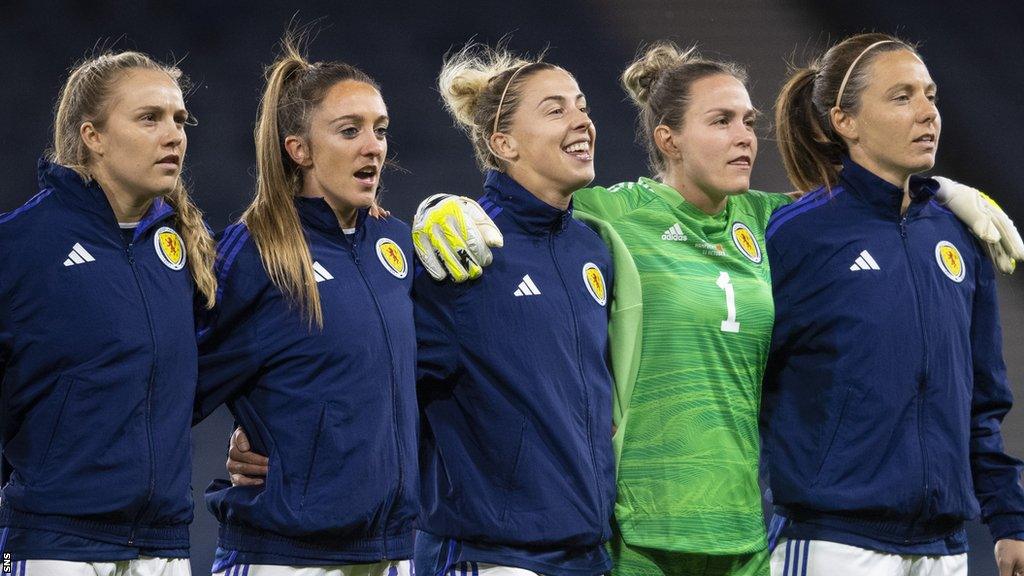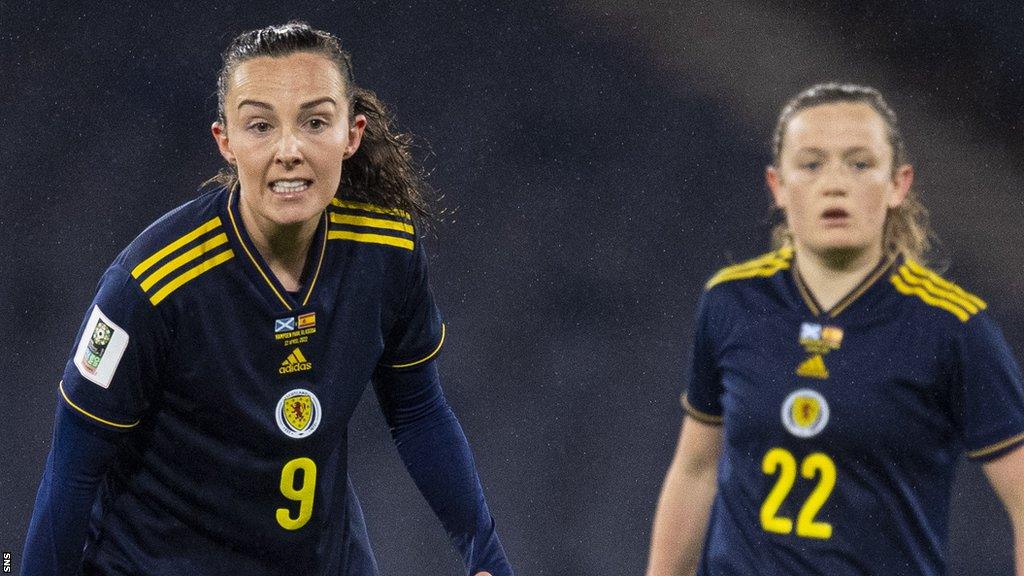Scotland women's team make legal challenge to SFA over pay and conditions
- Published

The players say their campaign is about parity with the men's national team
Scotland women's national football team are taking legal action against the Scottish FA in a fight over equal pay and conditions after talks broke down.
The squad, led by captain Rachel Corsie, are ready to take their case to an employment tribunal.
The players consider there to be disparities between their treatment and that of their male counterparts.
In response, the SFA said "equality should be at the heart of the development of the game at all levels".
Speaking to BBC Scotland, Aston Villa defender Corsie said the players felt obliged to speak out after two years of failing to reach agreement with the SFA.
"There is a significant number of examples where the players feel the resources in place are not where they should be. It's really important we make sure that doesn't continue," said the 33-year-old captain.
"We want there to be change moving forward."
Earlier, in a statement issued on behalf of the players, Corsie said: "This is about all professional footballers being treated equally.
"After years of iniquity, disrespect, and in some cases abuse, we have a historic opportunity to advance equal pay and to promote equality for women and girls in football.
"This campaign is about parity, and we'll be seeking to engage with the Scottish Football Association, the fans, and everyone in Scotland's football community to deliver this long overdue change."
The move comes after a landmark case won by the US women's national team earlier this year where they secured a pay-out of more than £17m.
The Scottish women's national team want the SFA to match the actions of the likes of the Football Association of Ireland, which pays the same match appearance fee to its male and female players.
The SFA issued a statement, external on Friday afternoon responding to the move by the women's national team.
It read: "No national team player, whether men's or women's, is paid to play for their country or receive 'appearance fees'.
"International representation is and should always be regarded as a privilege and not a job. Our men's and women's squads receive a per diem rate for their time with the national team, which has been exactly the same since 2017."
It goes on to say that the both sets of players "are incentivised to qualify for major tournaments, from which the teams are paid the same percentage of prize money from the tournament organiser" and that players from both squads are paid the same for "appearances involving designated official national teams' sponsors".
Corsie first represented the full Scotland team in March 2009 and has amassed 137 caps.
In April she and other members of her squad criticised the SFA on Twitter over its ticketing arrangements at Hampden, claiming only a portion of the national stadium would be open for the visit of Spain in a World Cup qualifier.
The SFA said it was "hugely disappointed by the post" and said: "The ticketing sales process used at Hampden Park is identical to most across Scottish football, with tickets sold in blocks, in line with ongoing demand."
The incident, which Corsie said brought to a head greater frustrations with the way Scottish women's football was organised, led to discussions taking place between Corsie and Ian Maxwell, the SFA chief executive.

Caroline Weir (left) and Erin Cuthbert are unhappy at the way commercial income is distributed between men's and women's football in Scotland
Scotland team-mates Caroline Weir and Erin Cuthbert are two other prominent players seeking what they view as a fairer share of funding from commercial deals.
"For so many years we've felt an after-thought, and whilst we have seen growth it's come as a result of driving our own change," said Real Madrid's Weir, capped 93 times by Scotland.
"Payments from sponsorship deals overwhelmingly go to the men's game, and to male players. In our current society, this is one example of the outdated prejudice towards one group of players.
"If shared out equally, there would be a dramatic increase in funding for women's and girls' football at all levels that would be transformative."
Chelsea's Cuthbert added: "This campaign must be the start of an irreversible turning point to forever change our national game, and the way women players are treated.
"It's about advancing and achieving equality in Scottish football."
Fraser Wishart, PFA Scotland chief executive, told BBC Scotland his organisation had been negotiating on behalf of the women's national team since 2017 and that, although no contract was currently in place, things had been operating "fairly amicably".
However, Wishart said the players feel they have reached an impasse with the SFA, in part because they do not have full disclosure of the men's agreements so therefore cannot guarantee parity for the women.
He said the argument came down to this: "Should female players playing for the Scottish national team get the same as male players playing for the Sottish national team? We believe that in law they should and that is something that will be debated at the employment tribunal."
'A fight for respect'
Chris McLaughlin, BBC Scotland sports news correspondent
This is a row that has been rumbling on for some time but this move gives an indication of how the talks have gone and the strength of feeling of those involved.
The women's national team have come a long way in the past decade, both in terms of results and profile. Given what has happened in other countries, and the United States in particular, this group now feel the time is right to make their point and stand up for what they believe in - the anger and frustration from senior players is clear.
The Scottish FA has made moves towards equality in recent years, though. Combined commercial deals have been signed, more resources have gone towards overseas training camps and the national stadium is now the home of the women's team and not just the men's.
The headlines for the upcoming tribunal will be about equal pay but for a group who see themselves as female role models, this is a fight for respect.